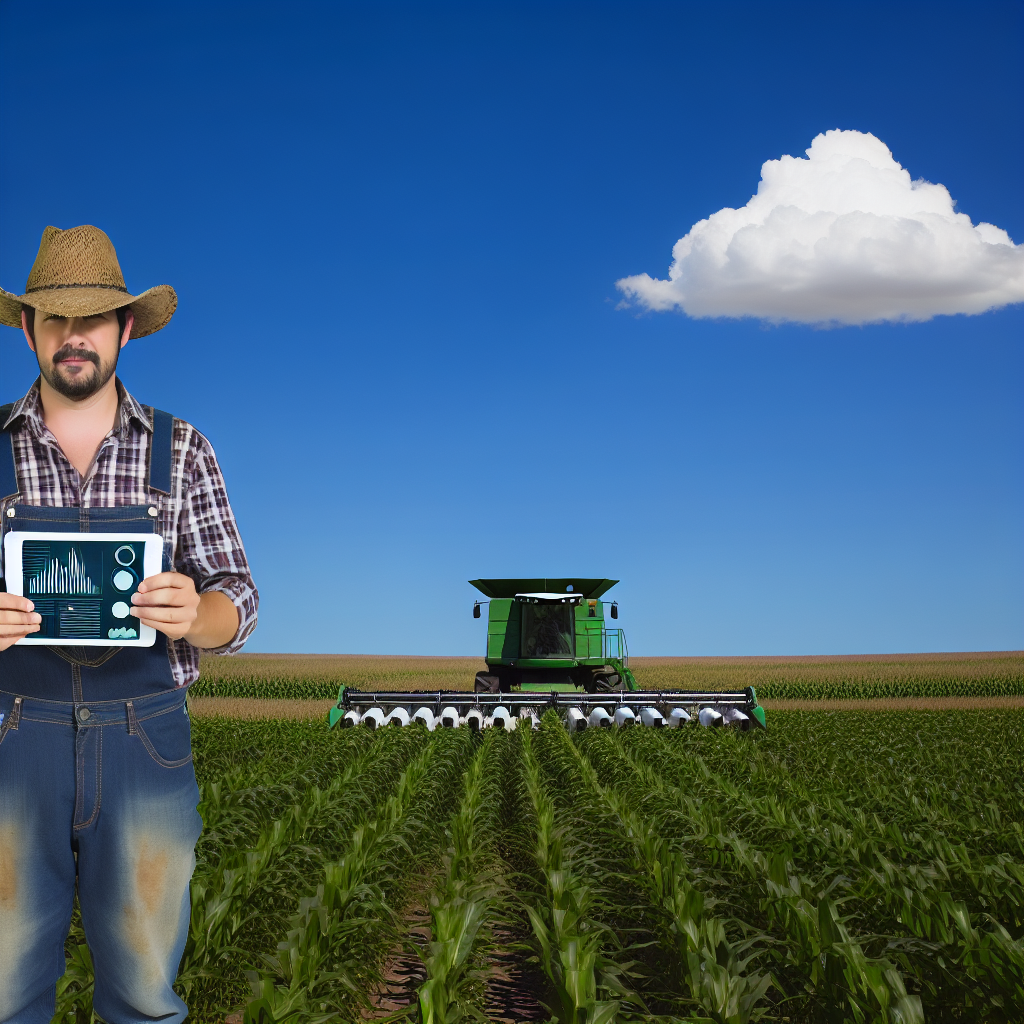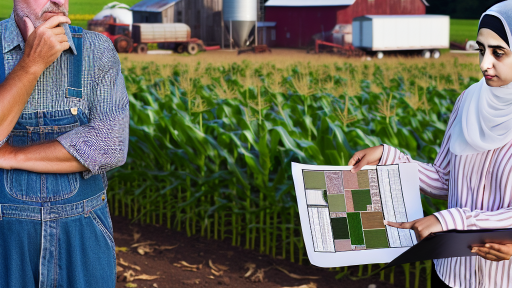Introduction to Cloud Computing and Its Relevance to Modern Farming
Cloud computing revolutionizes how industries operate today.
It allows users to access resources over the internet instead of traditional on-site infrastructure.
This technology has immense relevance for modern farming practices.
Enhancing Agricultural Efficiency
Farmers leverage cloud computing for increased efficiency.
They use cloud-based platforms to monitor crop conditions in real-time.
Besides, these platforms help optimize resource use, such as water and fertilizers.
Consequently, farms become more sustainable and cost-effective.
Data Analytics and Decision-Making
Cloud computing empowers farmers with advanced data analytics tools.
These tools analyze vast amounts of data collected from farms.
Farmers can make informed decisions based on these insights.
This leads to better crop management and increased yields.
Improving Supply Chain Management
Efficient supply chain management is critical in modern agriculture.
Cloud solutions facilitate better collaboration along the supply chain.
Farmers can track products from field to table seamlessly.
This transparency boosts productivity and reduces waste.
Transform Your Agribusiness
Unlock your farm's potential with expert advice tailored to your needs. Get actionable steps that drive real results.
Get StartedSupporting Remote Operations
Many farmers operate in remote locations.
Cloud computing enables them to manage their operations from anywhere.
They can control irrigation systems and monitor livestock through their smartphones.
This flexibility enhances operational control and responsiveness.
Facilitating Collaboration and Knowledge Sharing
Cloud platforms foster collaboration among farmers and agronomists.
They enable knowledge sharing and best practice dissemination.
Farmers can access expert advice and research findings quickly.
This community involvement leads to innovation in agricultural practices.
Overview of Cloud-Based Solutions for Farm Management
Enhanced Data Management
Cloud computing revolutionizes data management in farming.
Farmers access vital data in real-time from anywhere.
They can store extensive records efficiently and securely.
This capability enhances decision-making for crop yield optimization.
Real-Time Monitoring
Cloud technologies enable real-time monitoring of farm activities.
Farmers utilize IoT devices connected to cloud platforms.
This integration tracks weather patterns and soil conditions seamlessly.
Consequently, farmers can make timely adjustments to their practices.
Cost Efficiency and Resource Optimization
Using cloud-based solutions can significantly reduce operational costs.
Farmers can streamline processes and minimize resource wastage.
Cloud services eliminate the need for expensive on-premises infrastructure.
As a result, farms save money while improving productivity.
Improved Collaboration
Cloud platforms foster collaboration among farm stakeholders.
Farmers can share data with agronomists and consultants effortlessly.
This collaboration improves access to expert knowledge and resources.
Moreover, it leads to better farming strategies and outcomes.
Showcase Your Farming Business
Publish your professional farming services profile on our blog for a one-time fee of $200 and reach a dedicated audience of farmers and agribusiness owners.
Publish Your ProfileData Security and Backup Solutions
Cloud computing offers enhanced security for sensitive farming data.
Automatic backups ensure that data is safe from accidental loss.
Farmers can rely on multiple layers of security provided by cloud providers.
Thus, they protect their data from unauthorized access or breaches.
Scalability and Flexibility
Cloud solutions provide excellent scalability options for farmers.
Farmers can easily adjust their services based on seasonal needs.
This flexibility allows them to handle varying workloads effectively.
As a result, they can grow their operations without heavy investments.
Accessibility and Usability
Cloud-based platforms improve accessibility for farmers and workers.
Users can access information through mobile devices and computers.
This convenience helps farmers stay informed on the go.
Consequently, they can make productive decisions quickly.
Benefits of Using Cloud Computing in Precision Agriculture
Enhanced Data Management
Cloud computing allows farmers to access vast amounts of data efficiently.
They can store, process, and analyze data from various sources in real-time.
This accessibility promotes informed decision-making throughout the farming cycle.
Additionally, farmers can collaborate effectively with agronomists and specialists.
Improved Resource Allocation
Using cloud-based tools helps farmers optimize resource use.
They can track water usage, fertilizer application, and crop health easily.
Consequently, this optimization leads to reduced waste and lower costs.
Moreover, it promotes sustainable farming practices.
Real-Time Monitoring and Automation
Cloud computing enables real-time monitoring of crops and livestock.
Farmers can implement IoT devices to gather valuable data continuously.
This data helps in detecting issues early and applying timely interventions.
Additionally, automation tools can streamline routine tasks and improve efficiency.
Scalability and Flexibility
Cloud solutions offer scalability, adapting to farm size changes rapidly.
Farmers can easily upgrade resources as their needs evolve.
This flexibility encourages innovation without significant upfront investment.
Thus, farmers can experiment with new technologies and practices confidently.
Cost Savings
Adopting cloud computing can lead to significant cost savings for farmers.
They reduce the need for expensive hardware and maintenance costs.
Moreover, subscription-based services provide predictable budgeting options.
Overall, cloud computing helps improve the bottom line for farming operations.
Increased Collaboration and Sharing
Cloud technology fosters stronger collaboration among farmers.
They can share insights, best practices, and market information easily.
Collaboration leads to improved collective knowledge and community support.
Furthermore, partnerships with agri-tech companies become more seamless.
Uncover the Details: Marketing Tips for Successful Agribusiness Growth
Case Studies: Successful Implementation of Cloud Applications in Farming
Smart Irrigation Systems
Smart irrigation systems enhance water management in farms.
Cloud applications allow for real-time monitoring of soil moisture levels.
Farmers receive alerts about optimal irrigation schedules.
Showcase Your Farming Business
Publish your professional farming services profile on our blog for a one-time fee of $200 and reach a dedicated audience of farmers and agribusiness owners.
Publish Your ProfileThis technology reduces water waste significantly.
A successful case is Verde Farms in California, which improved yields by 30%.
The farm utilized cloud-based analytics for precise water usage.
Precision Agriculture
Precision agriculture enhances crop productivity through data analysis.
Cloud technology stores vast amounts of agricultural data efficiently.
Farmers can track crop health and input usage seamlessly.
For example, Green Fields Farm adopted drones linked to cloud software.
This integration helped them achieve a 20% increase in crop yields.
The data analysis led to targeted interventions for pest management.
Supply Chain Management
Cloud applications streamline supply chain operations in farming.
They provide real-time data access to all stakeholders.
For instance, Oceanic Harvest, a seafood farming company, improved logistics with cloud technology.
They reduced delivery times and enhanced product tracking.
This resulted in 15% reduced spoilage rates.
Moreover, the company gained valuable insights into customer preferences.
Farm Management Systems
Farm management systems integrate various operational aspects using cloud solutions.
These systems provide tools for planning, monitoring, and analyzing farm activities.
HarvestTech Farms implemented a cloud-based farm management platform.
This approach allowed real-time tracking of labor and production efficiency.
Consequently, they saw a significant increase in profitability.
Data Analytics for Predictive Outcomes
Data analytics in cloud computing provides predictive outcomes for farmers.
Cloud platforms analyze historical data to forecast crop yields and market trends.
For example, AgroVision uses advanced analytics to optimize planting strategies.
This company aided farmers in choosing the best planting times.
The results were dramatic increases in both yield and revenue.
Collaboration and Knowledge Sharing
Cloud applications facilitate collaboration between farmers and experts.
Farmers can share experiences and best practices through these platforms.
One success story is the FarmerConnect network in the Midwest.
This platform has connected over 500 farmers for knowledge sharing.
As a result, they improved their crop management techniques together.
This collaboration has fostered a vibrant farming community.
Explore Further: How to Easily Comply with International Agricultural Laws
Challenges and Risks of Cloud Computing in Agriculture
Data Security Concerns
Data security is a significant concern in agricultural cloud computing.
Farmers store sensitive information in cloud environments.
This includes financial data and crop management strategies.
Cyber attacks can lead to data breaches and financial losses.
Mitigating risks requires robust security measures and protocols.
Infrastructure Reliability
Cloud services depend on reliable internet connectivity.
In rural areas, internet access can be sporadic.
This inconsistency can disrupt cloud service availability.
Showcase Your Farming Business
Publish your professional farming services profile on our blog for a one-time fee of $200 and reach a dedicated audience of farmers and agribusiness owners.
Publish Your ProfileUnreliable infrastructure hinders real-time data access.
Farmers need alternative solutions to mitigate these issues.
Cost Implications
While cloud computing can reduce some costs, others may rise.
Initial setup fees can be substantial for small farms.
Monthly subscription costs can add up over time.
Farmers must evaluate long-term financial impacts carefully.
Budgeting for these expenses is critical for sustainability.
Data Ownership and Privacy Issues
Data ownership is often unclear when using third-party services.
Farmers may unknowingly relinquish control over their data.
This creates potential legal and ethical dilemmas.
Understanding the terms of service is vital for farmers.
They should seek clear agreements regarding data usage.
Integration Challenges
Integrating cloud solutions with existing systems is complex.
Farmers may face compatibility issues with legacy software.
This can lead to inefficiencies and delays in operations.
Challenges may arise during the training of personnel.
Proper planning and support can ease the transition process.
Delve into the Subject: Legal Aspects of Farm Succession Planning

Integration of IoT Devices with Cloud Platforms for Smart Farming
Understanding IoT in Agriculture
IoT devices play a crucial role in modern agriculture.
They collect real-time data from the fields.
This data includes soil moisture, temperature, and crop health.
Farmers can monitor these variables remotely.
As a result, they make informed decisions quickly.
Connecting IoT Devices to the Cloud
Integration with cloud platforms enhances data accessibility.
Farmers can access data from anywhere at any time.
This connectivity ensures that information is always current.
Cloud platforms also provide powerful data analysis tools.
Farmers can use these tools for predictive analytics.
Consequently, they can optimize resources effectively.
Real-time Monitoring and Automation
Real-time monitoring improves farm management.
Farmers receive instant alerts about important conditions.
For example, they can monitor irrigation systems remotely.
This leads to more efficient water usage.
Automation helps reduce labor costs significantly.
Additionally, automated systems can operate on schedules.
Case Studies: Successful Implementations
Many farms have successfully integrated IoT devices.
An example is Green Valley Farms in California.
They use soil moisture sensors linked to cloud systems.
This technology helps them reduce water usage by 30%.
Another case is Harvest Innovations in Texas.
Showcase Your Farming Business
Publish your professional farming services profile on our blog for a one-time fee of $200 and reach a dedicated audience of farmers and agribusiness owners.
Publish Your ProfileThey implemented drone technology for crop monitoring.
Drones provide high-resolution images for analysis.
The Future of Smart Farming
As technology advances, smart farming will evolve.
More farmers will adopt IoT and cloud integrations.
This shift will lead to greater sustainability in agriculture.
Ultimately, it ensures food security for future generations.
Find Out More: Blockchain for Transparent Agribusiness Transactions
Future Trends: How Cloud Computing Will Shape the Future of Agriculture
Enhanced Data Management
Cloud computing will revolutionize data management in agriculture.
Farmers can access, analyze, and store data from anywhere.
This accessibility enables them to make informed decisions quickly.
Moreover, real-time data processing will become standard practice.
Consequently, farmers can optimize resource use and increase efficiency.
Remote Monitoring and Automation
Integration of cloud computing will enhance remote monitoring capabilities.
Sensors placed in fields will collect vital information continuously.
Farmers will use this data for precision farming techniques.
Automation of irrigation and fertilization will follow suit.
This shift will lead to greater crop yields and reduced waste.
Improved Supply Chain Management
Cloud computing will transform supply chain management in agriculture.
Farmers will connect with suppliers and retailers seamlessly.
This connection will foster better inventory management and logistics.
Consequently, it will reduce delays in getting products to consumers.
Ultimately, this efficiency will enhance profit margins for farmers.
Collaboration and Knowledge Sharing
Cloud platforms will foster collaboration among farmers and researchers.
They can share best practices, research findings, and agricultural innovations.
This community-driven approach will accelerate agricultural advancements.
Additionally, farmers can receive support and updates on emerging trends.
This knowledge sharing will ensure sustainable farming practices thrive.
Sustainable Practices and Resource Optimization
Cloud computing will enable farmers to adopt sustainable practices easily.
Data analytics will provide insights into resource consumption.
Farmers will identify areas to reduce water and fertilizer usage.
This optimization will lead to healthier soils and ecosystems.
Moreover, sustainable practices will appeal to environmentally-conscious consumers.
Future Innovations and Technological Integration
The future will see continuous innovations in agricultural technologies.
Artificial intelligence and machine learning will complement cloud solutions.
These innovations will refine farming techniques and crop management.
As technology evolves, farmers will adapt to new tools and methods.
Thus, cloud computing will be pivotal in shaping smart agriculture.
The Importance of Embracing Cloud Solutions in Farming
Enhancing Efficiency and Productivity
Cloud solutions streamline farming operations significantly.
Farmers can access real-time data from any location.
This immediate access helps make informed decisions quickly.
Showcase Your Farming Business
Publish your professional farming services profile on our blog for a one-time fee of $200 and reach a dedicated audience of farmers and agribusiness owners.
Publish Your ProfileConsequently, it reduces downtime and resource wastage.
Automation tools integrated with cloud technologies save labor costs.
Moreover, farmers benefit from improved crop yield tracking.
Data-Driven Insights for Better Decision Making
Cloud computing enables sophisticated data analysis capabilities.
Farmers can analyze historical data to forecast trends.
This predictive ability helps manage crops effectively across seasons.
Additionally, cloud platforms aggregate data from multiple sources.
For instance, weather forecasts and market prices are easily accessible.
Such insights empower farmers to optimize their strategies.
Facilitating Collaboration Among Stakeholders
The cloud promotes seamless communication within the farming community.
Farmers can collaborate with suppliers, agronomists, and researchers easily.
This shared platform enhances knowledge transfer among partners.
Furthermore, collaborative tools help streamline logistics and supply chains.
As a result, partnerships become more productive and efficient.
Efficient stakeholder connections ultimately promote industry growth.
Driving Sustainability Through Innovation
Cloud solutions pave the way for sustainable farming practices.
Farmers can monitor their environmental impact more effectively.
Data analytics can lead to better resource management strategies.
This includes optimizing water usage and reducing chemical inputs.
Sustainability initiatives result in economic and ecological benefits.
In turn, they contribute positively to community health and resilience.
Future-Proofing Farming Operations
Embracing cloud technology prepares farmers for future challenges.
The agriculture sector faces pressure from climate change and population growth.
Adopting innovative solutions helps farmers adapt to these changes.
Cloud-based tools offer scalability as business needs evolve.
Additionally, staying current with technology ensures competitiveness.
Future-ready farms will thrive in an increasingly digital landscape.
Additional Resources
Enhancing smart farming through the applications of Agriculture 4.0 …
Application of digital technologies for ensuring agricultural productivity




